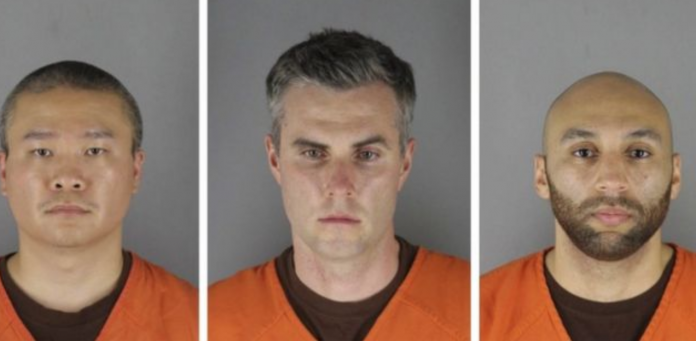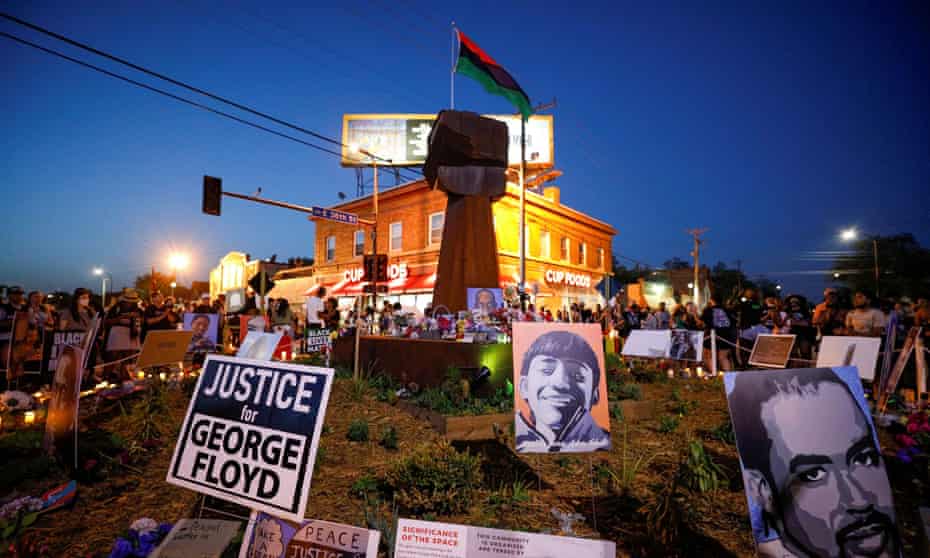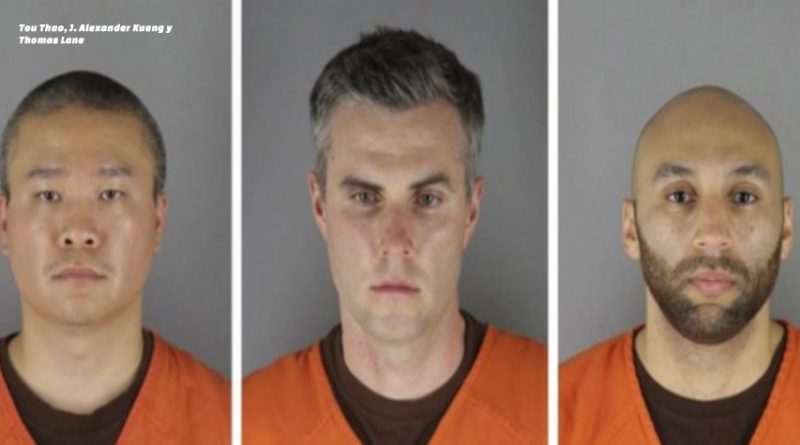Declaran culpables a los tres expolicías vinculados a la muerte de George Floyd / Three ex-officers found guilty on federal charges in George Floyd killing
Además de vulnerar los derechos civiles del afroamericano asesinado, dos de los agentes, Thomas Lane y J. Alexander Kueng, fueron declarados culpables de otro cargo por no haber hecho nada para frenar a Derek Chauvin, que cumplirá 15 años de cárcel
Por EFE -febrero 24, 2022
Un jurado declaró este jueves culpables a los tres expolicías que se quedaron mirando mientras uno de sus compañeros asfixiaba con su rodilla al afroamericano George Floyd, un suceso que provocó las mayores protestas contra el racismo en Estados Unidos en más de medio siglo.
Los expolicías Thomas Lane, J. Alexander Kueng y Tou Thao fueron declarados culpables de violar los derechos civiles de Floyd al no ayudarle cuando su entonces compañero del cuerpo de policía, Derek Chauvin, presionaba con su rodilla durante nueve minutos el cuello de Floyd, tumbado en el suelo.
Mientras eso sucedía, Lane agarraba los pies de Floyd y Kueng se arrodillaba sobre su espalda, mientras Thao intentaba apartar a quienes se acercaban a ver qué ocurría.
El delito federal de violar los derechos civiles de una persona se castiga con una variedad de penas que va desde prisión hasta cadena perpetua y cadena de muerte, según las circunstancias del delito y las lesiones que resultan del mismo, de acuerdo con el Departamento de Justicia.
Los tres exagentes, que en paralelo afrontarán otro juicio a nivel estatal, se declararon no culpables de los delitos que se les imputaban.

Derek Chauvin cumplirá 15 años de prisión
Además de vulnerar los derechos civiles de Floyd, dos de los expolicías, Lane y Kueng, los declararon culpables de otro cargo por no haber hecho nada para frenar a Chauvin.
El jurado popular de este juicio estuvo compuesto por cuatro hombres y ocho mujeres. Todos ellos parecían ser blancos, según la prensa local, aunque la corte de Minnesota donde se desarrolló el proceso no publicó datos raciales.
De los agentes condenados, Lane es blanco, Kueng es afroamericano y Thao se identifica con los hmong, originarios del sur de China.
Floyd perdió la vida el 25 de mayo de 2020 cuando los cuatro agentes intentaron detenerlo por haber utilizado un billete falso para pagar en una tienda.
El 25 de junio de 2021, a Chauvin lo condenó un tribunal estatal a 22 años y medio de cárcel, de los que cumplirá 15, por el asesinato de Floyd.
Chauvin también lo acusaron en un juicio federal de vulnerar los derechos civiles de Floyd, delito por el que se declaró culpable en diciembre pasado tras cerrar un acuerdo con la Fiscalía para cumplir simultáneamente esta condena con la que ya afronta por asesinato.
La muerte de Floyd provocó las mayores protestas contra el racismo en Estados Unidos desde el asesinato de Martin Luther King Jr a finales de la década de 1960.

Three ex-officers found guilty on federal charges in George Floyd killing
Trio of former Minneapolis officers found guilty of violating the civil rights of Floyd, murdered
A jury has convicted three former Minneapolis police officers of violating George Floyd’s civil rights.
Floyd, a Black man, was killed by white police officer Derek Chauvin. His video-taped death triggered widespread outrage and sparked anti-police brutality protests that spread across the US and the world.
A growing memorial is pictured outside Oxford high school, days after the shooting took place.
Tou Thao, J Alexander Kueng and Thomas Lane were charged with depriving Floyd of his right to medical care when Chauvin pressed his knee into Floyd’s neck for nine and a half minutes as the 46-year-old Black man was handcuffed and lying face down on the street on 25 May 2020. Thao and Lane were also charged with failing to intervene to stop Chauvin.
Chauvin was convicted of murder last year in state court and pleaded guilty in December in the federal case.
Kueng knelt on Floyd’s back, Lane held his legs and Thao kept bystanders back. Kueng and Lane both said they deferred to Chauvin as the senior officer at the scene. Thao testified that he relied on the other officers to care for Floyd’s medical needs as his attention was elsewhere.
Lane is white, Kueng is Black and Thao is Hmong American.
Conviction of a federal civil rights violation that results in death is punishable by life in prison or even death, but such sentences are extremely rare. The former officers will remain free on bond pending sentencing.
During the month-long trial, prosecutors sought to show that the officers violated their training, including when they failed to move Floyd or give him CPR. Prosecutors argued that Floyd’s condition was so serious that even bystanders without basic medical training could see he needed help.
The defense said their training was inadequate and that the officers deferred to Chauvin as the senior officer at the scene.
Prosecutors told jurors during closing arguments that the three officers “chose to do nothing” as Chauvin squeezed the life out of Floyd. Defense attorneys countered that the officers were too inexperienced, weren’t trained properly and did not willfully violate Floyd’s rights.
All 12 members of the jury of eight women and four men appeared to be white, although the court has not released demographics such as race or age.
That was a sharp contrast to the jury that deliberated the state murder case against Chauvin. That jury was half white and half non-white.
The federal jury pool was selected from throughout the state, which includes areas much more conservative and less diverse than the Minneapolis area from which Chauvin’s jury was drawn. Chauvin was convicted of murder and manslaughter, and later pleaded guilty to a federal civil rights charge.
Chauvin and Thao went to the scene to help rookies Kueng and Lane after they responded to a call that Floyd used a counterfeit $20 bill at a corner store. Floyd struggled with officers as they tried to put him in a police SUV.
Thao watched bystanders and traffic as Kueng knelt on Floyd’s back and Lane held his legs.
The jurors were not sequestered from outside influences that could sway their opinion, which is sometimes done by having them stay in hotels during deliberations. They were allowed to watch videos from the scene and view other evidence as much as they wanted during deliberations.
Lane, Kueng and Thao also face a separate trial in June on state charges alleging that they aided and abetted murder and manslaughter.
Associated Press
Thu 24 Feb 2022 22.37 GMT


 (1) (2).jpg)

